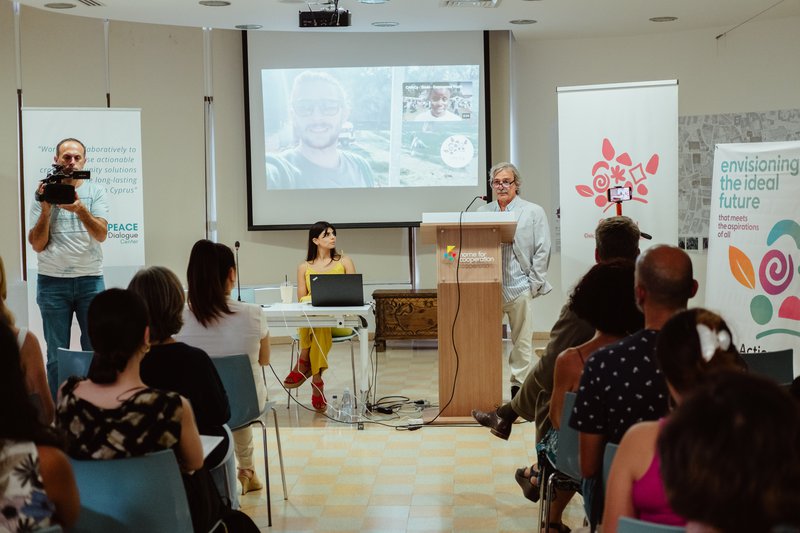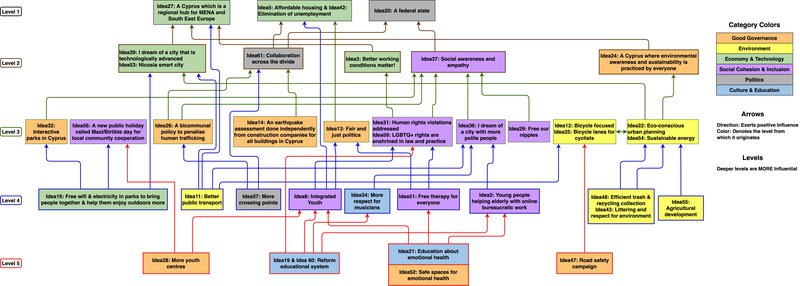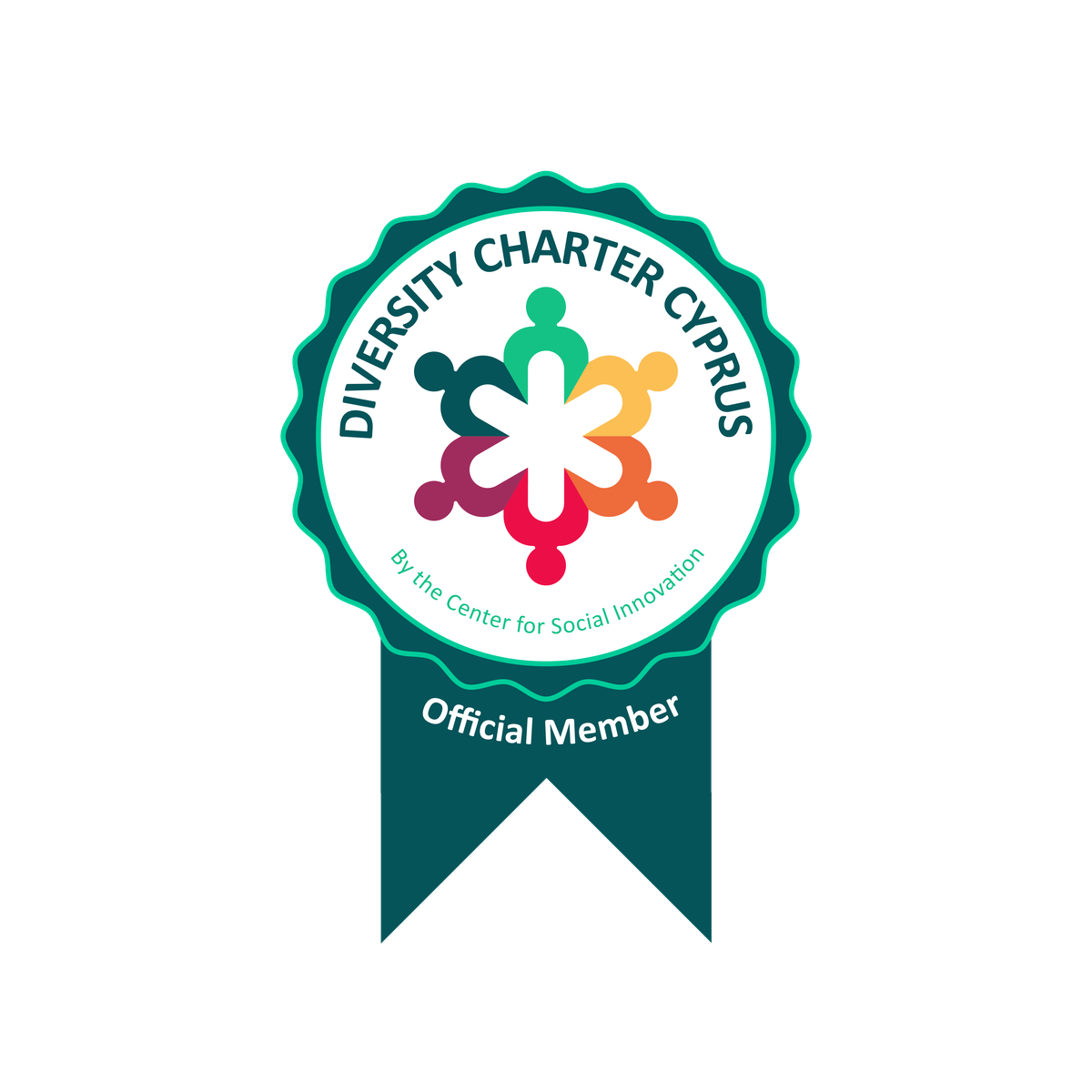Attempts to resolve the long-running Cyprus conflict are ongoing. One of the main critiques of peace talks between Greek Cypriots and Turkish Cypriots has been the closed nature of the negotiation process which, led by small elites in both communities, has never meaningfully involved the wider public. In 2009 this deficit in the political process prompted UNDP to support the Cyprus 2015 project. The project used public opinion polls to examine several dimensions of Greek Cypriot and Turkish Cypriot attitudes to the negotiations, and findings were communicated to the Greek Cypriot and Turkish Cypriot leaders and negotiating teams. The results were also used to establish a vibrant public debate about what a final settlement would look like. This was intended to garner genuine societal ownership – and by extension the long-term viability – of any future peace plan.
By 2012 it was clear that public polling of attitudes was insufficient to understand the drivers and dynamics required to reach a political compromise in Cyprus. When the Cyprus 2015 team formally constituted as a non-government organisation called the Centre for Sustainable Peace and Democratic Development (SeeD), UNDP agreed to finance innovative research into creating the social cohesion and reconciliation index (SCORE). The conceptual foundations for the index were established at an international workshop in 2012 which brought together 10 leading peace and reconciliation specialists from 6 different countries (Rwanda, South Africa, Northern Ireland, Serbia, USA and Israel).
Since 2012, we have been using the SCORE methodology as well as innovating new similar evidence-based frameworks to promote a better understanding of the island’s conflict, and provide evidence-based recommendations to Cyprus’ negotiators, decision makers and the UN leadership on the social and political drivers of a solution likely to be supported by the majority of Cypriots. We continue to work with the negotiating teams, the UN system, and the full range of civic and political actors to support evidence-based decision-making and promote civic behaviours that can lay the foundation for a durable political solution.
More recently, we have been implementing civic participation interventions in Cyprus using digital tools, developed Pusula platform, which is a digital civic participation tool that helps strengthen deliberative democratic mechanisms. Have a look at our different projects below.
Pusula/Ππούσουλας Campaigns for Civic Participation:
2022 - 2023
Civic Action Now in Cyprus

CAN-Cy which aimed to improve sense of civic duty, agency and purpose among young people in Cyprus and their meaningful participation in socio-economic, cultural and political life was launched in the summer of 2022 and came to conclusion in December 2023. CAN-Cy created a shared vision and roadmap for a better future for Cyprus compiled by actionable and solution-oriented ideas generated by people who call Cyprus as their “home”.
CAN-Cy adopted a unique process framework and deployed multiple digital and social media tools and methodologies aimed at improving democratic participation and decision making. These included. Pusula / Ππούσουλας civic participation digital platform, Structured Democratic Dialogue Process (SDDP) for collective decision making among diverse groups and Idea Prism, a digital application for ideation and assessing different ideas online.
CAN-Cy started with an ideation & EnVisioning phase (September 2022 – February 2023). The project team connected with local authorities, NGOs and young people, using social media tools such as a dedicated YouTube channel and Facebook page and created a Pusula ideation campaign for a more inclusive and cohesive future Cyprus. During this period CAN-Cy also organised various ideation events where the SDDP methodology was introduced to the participants. These ideation events happened in different locations across the island, from Nicosia to Paphos, Kyrenia to Famagusta in collaboration with municipalities and/or local organisations. As a result, over 50 idea authors, representing myriad demographics, generated over 120 solution-oriented ideas, most of them in the format of one-minute-long videos. The ideas then were categorised in 6 thematic areas: Politics, Education, Culture & Sports, Good Governance, Economy & Technology, Environment, Social Cohesion & Inclusion.
CAN-Cy Public voting and Evaluation phase (February 2023- April 2023). Ideas were disseminated and socialised the ideas on social media and via our contacts. We encouraged the public and the idea authors to vote, like and/or share for the ones they support. A set of experts from different fields as well as the CAN-Cy project’s core team also evaluated the ideas based on their potential impact, inclusivity feasibility and desirability. This multi-layered evaluation helped us select the top 60 ideas that progressed to the next stage.
Refining and formation of the roadmap (June 2023). The 60 ideas then went through the Structured Democratic Dialogue Process where participants either merged similar ideas or created relational pathways between ideas to form an influence roadmap based. The Influence Roadmap that visualized a common practical and sequential way forward was widely disseminated.
Public Launch, Public Visibility and Stakeholder engagement (July 2023 - November 2023). CAN-Cy project formed an alliance with Cyprus Peace and Dialogue Centre and on 13th July a public launch event at Home for Cooperation was held to showcase the ideas and the roadmap. Many people attended representing various public and political actors, NGOs, participants, ambassadors, collaborators and stakeholders. During the event 2 of the most active Can-Cy participants represented the ideators and presented the roadmap. The idea catalogue booklet which summarises ideation process and presents the links to all the submitted ideas, the report on the journey to the roadmap and the roadmap itself were disseminated widely in soft and hard copy.
CAN-Cy Project Mentorship and Life skills Programme (October 2023 - November 2023). The projects final phase was equipping and empowering the ideators, young people and other interested civil society actors with different skills and competencies not only to support them towards actualization of their ideas into projects but to have an arsenal of skills for any future projects they may want to pursue. The programme was delivered in form of online and face to face webinars and workshops to optimise maximum participation. It started with:
- Inclusivity and Racial Sensitivity While Designing a Project, delivered by Yassine Chagh,
- Leadership, Creative Thinking and Collaborative Decision-making delivered by Dr. Ilke Dagli-Hustings,
- Designing Mental Health and Psychosocial Support Projects for Social Inclusion delivered by Dr. Kalia Nikolaou,
- Pitching and Proposal Writing; How to turn an idea into a project?
- Project Fundraising both delivered by Sezis Okut,
- and finally ended with Project Advocacy webinar, delivered by Melis Eroglu.
CANC-Cy Roadmap

Check out CAN-Cy Journey to the Roadmap here
Check out CAN-Cy idea catalogue here!
Civic Action Now – Cyprus (CAN-Cy) is a joint initiative implemented by the Future Worlds Centre (FwC) and the Centre for Sustainable Peace and Democratic Development (SeeD). Project benefits from a grant under the Active Citizens Fund Cyprus programme, funded by Iceland, Liechtenstein and Norway, through the EEA and Norway grants.
2022
‘Equality Makes Sense’ campaign
Equality Makes Sense aims to contribute to progress in gender equality by raising awareness on its importance and sensitizing people to take action for gender equality in Cyprus.
The campaign will run from 31st March – 29th April, inviting people from all communities of Cyprus (all age groups, all genders, rural/urban), to share ideas on simple, yet impactful ways to improve gender equality in personal, professional and political life (e.g. equal share of house chores and child care, addressing gender pay gap, gender-balanced representation in politics).
Once the campaign is completed, the ideas submitted on the platform will be disseminated through social networks and traditional media. In addition, a public event will be organised in early May, where the ideas will be presented and discussed by stakeholders and gender experts.
The campaign is financed by The Embassy of Sweden and the Friedrich-Ebert-Stiftung and implemented in partnership with Centre for Sustainable Peace and Democratic Development (SeeD).
2018 - 2021
Building Pusula / Ππούσουλας
The World Bank’s Mind, Behavior, and Development unit (eMBeD) and SeeD formed a collaboration that aims to understand and address differences in attitudes and perceptions towards reconciliation horizontally and vertically across all levels of society (civic, administration, private sector) through a combination of diagnostics, workshops and interventions that promote better communication, social contact and perspective taking. By focusing on activities that can be done at scale in both the TCc and GCc, this collaboration aimed to address the low levels of intercommunal trust and social cohesion across the island, something that could lead to sustained welfare gains for all and support the resumption of the peace talks for a solution.
The activities developed jointly were based on extensive diagnostic work and meta-analysis of research completed to date by both organisations and further research conducted as part of their joint collaboration. Behavioral interventions developed as part of this collaboration include:
- Pusula / Ππούσουλας, is a digital civic engagement platform that connects people with each other and public decision makers for a better Cyprus. Pusula / Ππούσουλας aims to empower people to interact, share ideas and decide jointly on how to solve societal problems at the neighborhood, village, city or island-wide level. Pusula / Ππούσουλας can also be used for supporting the reconciliation process and promoting inclusivity of the Cyprus peace process by improving the conversation between leaders and their teams by providing timely inputs about public opinion. Pusula / Ππούσουλας aim is to increase transparency and trust across the communities as well as between people and the public decision makers by fostering meaningful interaction and collaborations within the societies. By providing an online space for sharing ideas and voting for the best ones, Pusula / Ππούσουλας allows people to offer their solutions to every-day problems.
- Pusula / Ππούσουλας’s first island-wide campaign (February - May 2020): invited people to share ideas that could improve everyday life in Cyprus. Many of the 56 proposals submitted promoted environmentally sustainable solutions based on the principle of ‘Reduce, Reuse, Recycle’. The winning idea that received the most votes from the public was Gardens of the Future, promoting urban sustainable farming through a network of gardens. The Interactive Report can be found here.
- Pusula / Ππούσουλας’s second island-wide campaign (3rd - 30th May 2021): was the #Live2EatCyprus social media challenge, which focused on the protection of environmental resources through the reduction of food waste. The #Live2EatCyprus challenge invited everyone in Cyprus to share their knowledge, success stories and tips to improve our habits around food waste at home.
Follow Pusula / Ππούσουλας on Facebook, Instagram (@PusulaCyprus) and Twitter.
SCORE Cyprus and Evidence Creation Efforts beyond SCORE
2021
The Social Cohesion and Reconciliation Index (SCORE) within the Cyprus Institute Staff Community (Values Survey)
The CyI Institutional SCORE Assessment was SeeD's first institutional assessment developed in collaboration with the Equal Opportunities Committee of The Cyprus Institute. The project tailored the SCORE Index to an institutional context, measuring social cohesion within the institute's community of staff and students. The study looked at how the core values of the CyI formed the foundations of social cohesion in the Institute community, as well as the interplay between the core values and other variables in the work environment. The findings were used to develop a series of recommendations to the Institute's management, enabling the design of internal policies and activities to strengthen social cohesion and coexistence within the CyI community.
Promoting Dialogue for Change: Peace Advocacy through Youth Empowerment
SeeD worked together with PPCY and CyprusInno on the project Promoting Dialogue for Change: Peace AdvocacyThrough Youth Empowerment, funded by theEuropean Union and implemented by Barış Oyuncuları-Kıbrıs andPeacePlayers-Cyprus. SeeD was tasked with conducting several focus group discussions with youth (16 - 30) on issues relating to reconciliation, peace, conflict and social cohesion in Cyprus, which were organised and conducted through Winter 2020. The focus groups contained 35 young activists, students, researchers, professionals and leaders, who wanted to raise their voice and contribute to the discourse around reconciliation and conflict on the island. Most of the participants were not from Nicosia. The recommendations and conclusions that the young participants drew, were then written up into a policy brief named "The Voice of Cypriot Youth on Peace and Reconciliation: Cypriot youth’s policy recommendations on the Cyprus issue and sustainable peace on the island". Youth concluded the education sector and the meaningful participation of youth were two key dimensions in progress on conflict resolution in Cyprus.
2016 - 2018
The Security Dialogue Initiative
The Security Dialogue Initiative (SDI) aimed to support the Cyprus Peace Process by researching, understanding and formulating solutions for the security needs and fears of the two main communities in Cyprus and the potential risks that may arise during a post-transition period. SDI explored and designed viable and evidence-based security arrangements that could enable all communities in Cyprus to simultaneously feel secure. The research and subsequent advanced analysis that involved over 3000 people across the island produced the New Security Architecture for Cyprus, which was a highly valuable document that informed the security negotiations on the leaders' level as well as among the general public. In the run up to the high level peace talks at Crans Montana in June 2017, we discussed our proposals with key people who would be attending the peace conference both in Cyprus and in Geneva. Establishing a strong line of communication and constructive dialogue with different stakeholders ranging from the national negotiation teams to members of parliament to UN officials, the SDI was instrumental in shaping and shifting the security debate on the island. You can read the SDI Security White paper here or the Oxford Research Group blog post based on SDI findings here.
The second phase of SDI was focused on Gender, Peace and Security Agenda. The SDI findings with the identified gender and gendered insecurities as crucial elements that require further research to inform negotiations and promote a more inclusive and resilient peace process. SDI revealed that Cypriot women and men also differed in the ways that they talked about the conflict. Women talked at length about the context of the dispute, particularly focusing on the relationship with the other community, they were most concerned about everyday security, and talked about fairness in a way that incorporated both their need for stability and material interests. Men used more linear and legalistic language, and were most concerned about state security. Considering that women’s heightened insecurities translate into scepticism and resistance for the peace process, their inclusion as well as acknowledging their perspectives, perceptions and needs would not only make the process more inclusive but also more resilient. As such, the Gender SCORE Cyprus process was designed to unpack gendered securities, gender stereotypes as well as obstacles and opportunities to fostering women's meaningful participation in political, economic and social life in Cyprus. For a more detailed account of SDI's gender findings, visit our list of publications here.
The SDI was implemented with our international project partners, the Berghof Foundation and Interpeace and funded by the U.S. Department of State, the Federal Foreign Office of Germany and the Netherlands Ministry of Foreign Affairs.
2012 - 2016
The Social Cohesion and Reconciliation Index (SCORE)
SCORE was born in Cyprus even before SeeD. Founding members of SeeD were working on the first ever iteration of SCORE since 2009. Different SCORE studies and publications were produced between 2013 and 2016, which can be accessed through our publications page and data hub pages. Although SCORE methodology evolves and grows constantly, the second edition of the SCORE Book from 2015 can be found here.

The Diversity Charter Cyprus (DCC) was developed in 2019 and is officially represented and managed by the Center for Social Innovation Ltd. SeeD became a signatory to the Charter in November 2020.